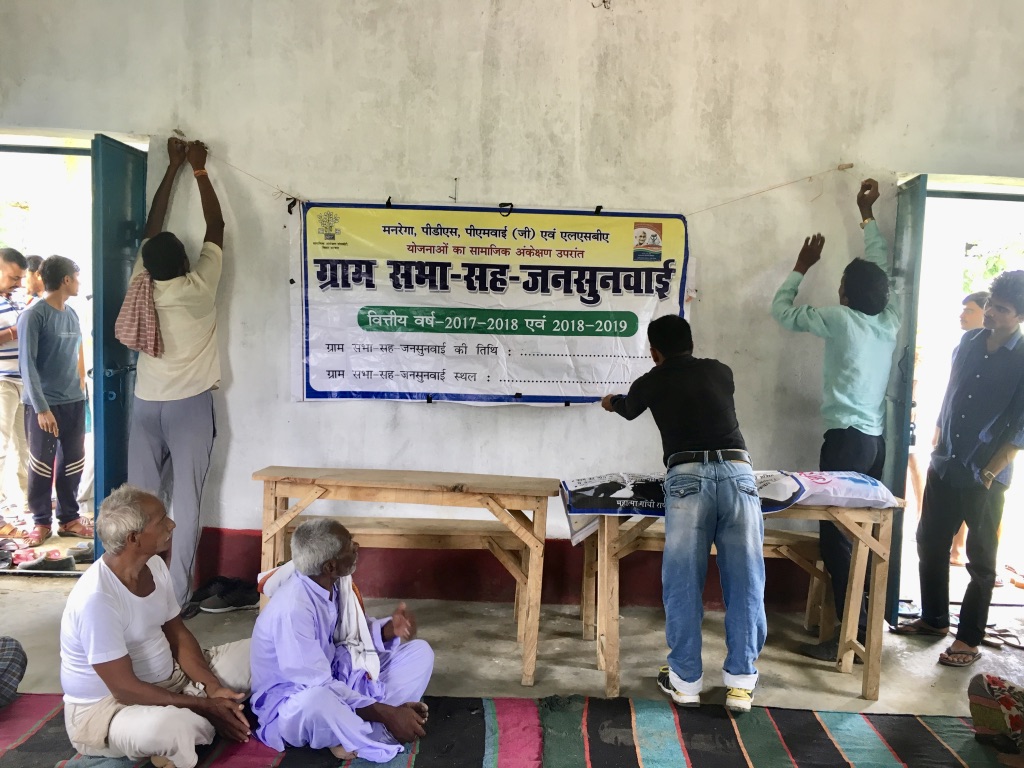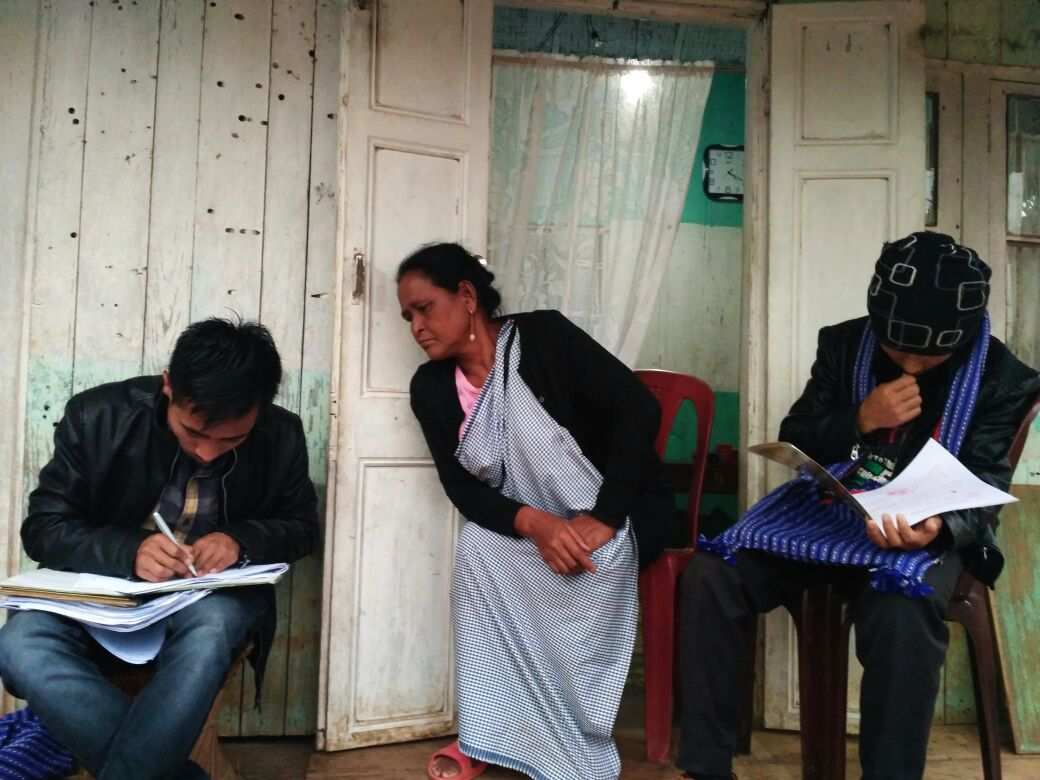The practice of the social audit received nationwide acceptance with its inclusion in the Mahatma Gandhi National Rural Employment Guarantee Act (MNREGA). MNREGA’s institutional architecture has advanced possibilities of extending the social audit to other programmes. The Parliament and Government through legislations and executive orders, have mandated audits of the National Food Security Act, Persons with Disabilities Act, National Social Assistance Programme, Pradhan Mantri Awas Yojana, Pradhan Mantri Gram Sadak Yojana, Swacch Bharat Mission, Sarva Shiksha Abhiyan etc. The Supreme Court’s directive to conduct audits in implementing the Building and other Construction Workers (BoCW) and the Juvenile Justice acts have also furthered the impact of social audits.In issuing the Auditing Standards of Social Audit, the Comptroller and Auditor General of India laid down minimum standards of the social audit process that emphasizes independence, credibility, and quality.
Social Audit of National Food Security Act, Kerala
SAFAR facilitated social audits of the National Food Security Act in collaboration with the Department of Food and Civil Supplies (Kerala), the Tata Institute for Social Sciences, and the State’s Social Audit Unit. The audit was conducted in a low-income residential area in Kerala’s capital, Thiruvananthapuram. The audit identified and highlighted limitations in digital transparency, emphasizing the need for ongoing citizen education on rights and entitlements - a necessity if digital tools are to be accessible to the ordinary citizen - in its report. SAFAR created an instructional toolkit for auditing the NFSA, which led the government to conduct social audits in all its districts.
Social Audit of Destitute Free Kerala Programme
SAFAR facilitated a pilot social audit of the Destitute Free Kerala Programme of the Govt. of Kerala, in collaboration with the Kerala State Social Audit Unit. The Programme, implemented by the State’s Kudambashree network, identifies and assists “destitute” families through participatory processes with the help of local self-governments. This was the first-ever social audit conducted since the Programme’s inception in 2004. Based on the successful conclusion of the pilot, the State Government has ordered audits to be conducted in other parts of the State.
Social Audit of Building and Construction Workers Act, Delhi and Rajasthan
In 2019, the Supreme Court of India called for social audits of the Building and other Construction Workers (BoCW) Act, which regulates conditions of employment of construction workers. SAFAR worked with civil society organizations and unions in collaboration with the State and Central Governments to pilot social audits of BoCW in Delhi and Rajasthan. The audits uncovered serious inadequacies in its implementation: instances of workers paying bribes to register under BoCW, a lack of information about status of workers’ applications, institutionalized corruption, and the exclusion of eligible beneficiaries. Upon its successful completion, the audit led to the implementation of several corrective measures. The national Ministry of Labour and Employment subsequently directed all state governments to conduct social audits based on the SAFAR pilot.

Social Audit Training and Pilots, Meghalaya
Meghalaya is the country’s first state to enact a law that mandates social audits across more than 21 schemes and 11 departments in the State. The law enables citizen participation in development planning, monitoring programmes, and grievance redressal of grievances. In a 6th schedule area like Meghalaya, it provides democratic tribal communities the agency to harness community decision-making to shape development programmes. SAFAR has collaborated the Meghalaya Government, civil society organizations, and the Social Audit units of Jharkhand and Telangana to conduct pilot social audits, steer training programmes, and draft guidelines.
Institutionalizing civil society participation in SAUs and social audit processes
Social audits began as an experiment in strengthening transparency and accountability in Rajasthan in the late 1990s. Since then, this experiment has proliferated, geographically and in in terms of the number of schemes and programs it now applies to. It has entered the law and been institutionalised with some degree of independence in several states across India. Social audits are now mandated across a range of social sector rights including employment, food security, worker rights, persons with disabilities, children in conflict of law and education. More than 6000 Resource Persons have been deployed across the country to facilitate social audits according to codified standards, and are paid for by the state. With this evolution of social audits from a largely movement-led process to one that is now embedded within government institutions, the theory and practice of social audits itself continues to evolve. In Rajasthan and in Bihar, SAFAR is engaged with the social audit units to institutionalize the process of dialogue and participation of civil society in the process of social audit in order to strengthen the audit as well as ensure monitoring of the processes. The aim is to make sure that the social audit process that emerged from civil society action maintains its sanctity as well as adheres to the social audit standards of CAG. SAFAR is also supporting social audit units in Bihar and Rajasthan to strengthen its processes of social audits to improve quality of reporting, monitoring and review, and effective grievance redress. SAFAR supports the social audit units by facilitating the creation of standard operating procedures, verification formats, and action taken report formats through consultations and workshops with civil society organizations and the Government.
Social Audit of COVID ex gratia relief to workers, Meghalaya
On 28th March 2020, the Labour Department, Government of Meghalaya published initiated a scheme titled ‘Chief Ministers Relief Against Wage Loss (CRAWL)’ to provide financial assistance to the marginal sections of the society who were deprived of their daily wages during the lockdown period. This involved a transfer of Rs. 700 per week to their bank accounts. An RTI was filed to access the list of people who availed the benefit. The documents furnished by the department showed that there were 1,35,241 beneficiaries under CRAWL who received Rs. 2100 between 5th May 2020 and 13th October 2020; and 25,684 beneficiaries who received Rs. 5000 from the Meghalaya Building And Other Construction Workers Welfare Board between 27th March and 29th October,2020. To verify the list of the beneficiaries as listed by the document furnished by the Labour department, the records accessed through the RTI were in the public domain for people to check out the claims of the government. A “virtual social audit” was attempted as conducting physical social audits through door to door verification was not possible because of lockdown restrictions imposed due to the second wave of COVID. This included making telephone calls to people listed in the records, sharing the list through multiple whatsapp groups and websites and asking people to report instances where details of benefit transfer made against their names were found to be incorrect.
This brought out many anomalies such as many who had registered for the support not getting the support; most of those who got the support did not get the complete amount of either Rs. 2100 or Rs. 5000. Many either got Rs. 700 or Rs. 1400 even though in the list it showed that Rs. 2100 had been booked against their names. Many against whom Rs. 5000 was booked received less or nothing at all. A formal complaint has been filed with the Chief Ministers Office and with the Chief Justice of the High Court for ensuring redress of individual grievances which will include returning money to those workers who complained of getting lesser than what is recorded; stating reasons why applications from certain workers were rejected and ensuring that transparency and accountability measures are taken to prevent such wide spread denials in subsequent rounds of ex gratia relief payments.
Social Audit of Integrated Child Development Scheme (ICDS) and Mid-day Meal (MDM) Scheme in Rajasthan
Department of Women and Child Development, Government of Rajasthan in collaboration with the Soochna evum Rozgar Abhiyan (SR Abhiyan), a coalition of more than 80 civil society groups that SAFAR is also a part of, initiated pilot social audit, in February 2021, of the ICDS in 52 anganwadi kendras spread across 11 districts. 50 schools in these 11 districts were also covered in order to pilot social audits for the MDM. The entire process spanned across 14 days starting from a two-day residential training of 6 social audit facilitators per district, which included 3 social workers, 1 ASHA sahayogini/sahayak, 1 Saathin (Woman employee of WCD department selected by the Gram Sabha who is tasked with educating women on health and nutrition related issues as well as empower them socially and economically), and 1 ward member / councillor. The team spent seven days in the field while going door to door to verify beneficiary-wise information shared by the department prior to the training. All the teams facilitated Jan Sunwai (public hearing) on the 7th day across all 11 districts of Rajasthan, which were attended by more than 2200 people of whom majority were women. WCD department officials from the state as well as from the district level along with other prominent civil society leaders also attended these public hearings as panellists in the jury. Summary report was prepared and findings from the pilot were presented to the Additional Chief Secretary (ACS), WCD and his team. Key decisions around accountability and transparency as well as other operational aspects like expanding coverage and setting up a MIS to name a few, as well as scaling up social audits in the entire state were taken in the final debriefing meeting with the ACS and other department officials.
Supporting Social Audit Unit (SAU) in Bihar
SAFAR is supporting the Bihar Social Audit Unit to improve social audit processes, to improve governance of the SAU, and to enhance its capacity to become more effective in the state. Some of the interventions include facilitating workshops for SAU staff, line departments, and civil society groups to develop social audit formats for various schemes and programs, providing technical assistance in setting up a state MIS for social audit, training of SAU staff as well as of jury members, and assisting the unit in preparing standard operating procedures (SOP) to ensure follow up action on social audit findings to name a few. Additionally, SAFAR is also advocating for expanding the scope of social audit in the state as well as for ensuring public monitoring of social audit operations in the state.


